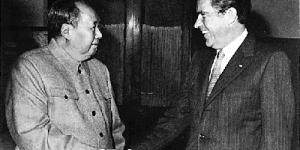Join us for a free one-day workshop for educators at the Japanese American National Museum, hosted by the USC U.S.-China Institute and the National Consortium for Teaching about Asia. This workshop will include a guided tour of the beloved exhibition Common Ground: The Heart of Community, slated to close permanently in January 2025. Following the tour, learn strategies for engaging students in the primary source artifacts, images, and documents found in JANM’s vast collection and discover classroom-ready resources to support teaching and learning about the Japanese American experience.
Declassified transcript of the Beijing meeting between China's leader and America's. It took place in Chairman Mao's living quarters.
Held at the White House. This was Richard Nixon's 22nd press conference. In addition to discussing the trip to China, there were questions raised concerning the war in Vietnam, the frequency of the president's news conferences, recognition of Bangladesh, and other matters.
Part of a larger report on U.S. foreign policy. The report was delivered to Congress only days before Nixon left for China.
December 19, 1971 Taiwan's Presbyterian Church provides a statement on the ROC's "national fate".
The UN General Assembly expelled Taiwan and admitted the PRC.
In 1971, the United Nations General Assembly voted to recognize the Beijing-based government of the People’s Republic of China as the lawful representatives of China. The vote was 76 in favor, 35 opposed, with 17 abstaining.
National Security Adviser Kissinger met with Huang Zhen, China's Ambassador to France. Winston Lord prepared this memorandum which was approved by Kissinger on August 28.
The President explained that National Security Adviser Henry Kissinger had been meeting with Chinese Premier Zhou Enlai and that it had been agreed that the President would now go to China.
This document came to light when John Rousselot (R-Los Angeles, California) had it placed into the Congressional Record on August 6, 1971, with a month of President Nixon announcing that he would go to China. Rousselot served in the House of Representatives 1961-63 (CA-25) and 1970-83 (CA-25 and then CA-26).
The article outlines foreign policy issues during 1967.
Pages
Featured Articles
Please join us for the Grad Mixer! Hosted by USC Annenberg Office of International Affairs, Enjoy food, drink and conversation with fellow students across USC Annenberg. Graduate students from any field are welcome to join, so it is a great opportunity to meet fellow students with IR/foreign policy-related research topics and interests.
RSVP link: https://forms.gle/1zer188RE9dCS6Ho6
Events
Hosted by USC Annenberg Office of International Affairs, enjoy food, drink and conversation with fellow international students.
Join us for an in-person conversation on Thursday, November 7th at 4pm with author David M. Lampton as he discusses his new book, Living U.S.-China Relations: From Cold War to Cold War. The book examines the history of U.S.-China relations across eight U.S. presidential administrations.





